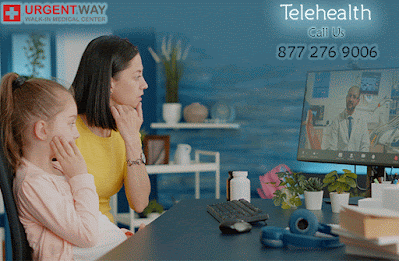ENT Problems: When to go urgent pediatric care.
Being a
responsible parent helps you maintain good habits by supporting your child's
development, such as keeping their ears, nose, and throat in good condition.
Unfortunately, sometimes it can be challenging to ensure that their ENT is
fully developed by the age of six.
It can be painful to see your children sick because
they cannot fully express how they feel. However, you should know when to see
your pediatrician or take him to the nearest urgent pediatric care.
We discuss four ENT problems your children may face and
some guidelines for seeking urgent pediatric care and consulting with your
pediatrician.
Common colds. Colds can affect
children year-round and the disease affects the ears, nose, and throat. These
can easily be mistaken for symptoms of the flu, COVID-19, a sinus infection, or
strep throat.
Treatment
at home
Prescription drugs may be given if a sore throat lasts for only a week with no fever, just sneezing, sniffling, and coughing. Ear infections in babies are common and usually nothing to worry about. Many young children do not need antibiotics and can be treated with home remedies such as acetaminophen, warm compresses, and drinking more fluids.
When
to seek urgent pediatric care
Ear infections can usually be treated at an urgent care
clinic or urgent pediatric care. "If you can talk to your doctor, that's a
good idea, especially if the problem recurs. Symptoms can get worse, so if you
have pain, persistent hearing loss, or other persistent discomforts If so,
contact your nearest urgent care pediatrician to manage your ear infection
before it becomes a serious problem.
On the other hand, if your child is showing symptoms of
the flu or COVID-19, take him to the nearest urgent care clinic. Also, be
careful if you have a high fever that lasts more than 72 hours and is sick for
more than 10 days. Also, if mucus discharges thin or yellow, take the child to
the local emergency room immediately.
Talk to your pediatrician if your child has a common
condition that causes recurrent sinusitis or recurrent tonsillitis.
Snoring
or noisy breathing
These conditions are not normal in children or even
adults and should be checked to see if they occur regularly.
Treatment at home
You don’t need to worry much if your child only snores
when they have allergies or colds unless they display other severe symptoms.
If it only happens when your child has allergies, a
cold, or other minor illnesses, there's likely no need to see a doctor. Unless
other symptoms warrant a visit.
When to go for urgent pediatric care
If your child snores or breathes constantly, even when
not constipated. Consult a pediatrician if first responders suspect a child's
snoring or noisy breathing is due to enlarged tonsils, adenoids, sleep apnea,
chronic sinusitis, or a deviated nasal septum. Even if you're not constipated,
if you snore or have trouble breathing, you need urgent pediatric care, if the
children’s urgent care provider suspects that sleep apnea, enlarged tonsils,
adenoids, chronic sinusitis, or a deviated septum causes their snoring or noisy
breathing.
Young children are more susceptible to ENT infections
because their ears, nose, and throat are underdeveloped. Understanding when to
provide home care or take your child to the local urgent pediatric care will
help you make the right medical choice for your child. If your child needs
urgent treatment for an ENT infection, take your child to Your Pediatric
Care! We provide high-quality pediatric urgent care in New York.





Comments
Post a Comment